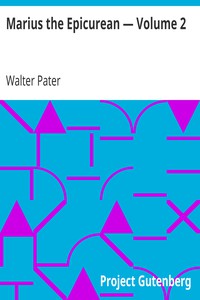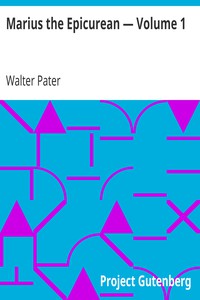Marius the Epicurean — Volume 2, Walter Pater [best romantic novels in english txt] 📗

- Author: Walter Pater
Book online «Marius the Epicurean — Volume 2, Walter Pater [best romantic novels in english txt] 📗». Author Walter Pater
For still, in a shadowy world, his deeper wisdom had ever been, with a sense of economy, with a jealous estimate of gain and loss, to use life, not as the means to some problematic end, but, as far as might be, from dying hour to dying hour, an end in itself—a kind of music, all-sufficing to the duly trained ear, even as it died out on the air. Yet now, aware still in that suffering body of such vivid powers of mind and sense, as he anticipated from time to time how his sickness, practically without aid as he must be in this rude place, was likely to end, and that the moment of taking final account was drawing very near, a consciousness of waste would come, with half-angry tears of self-pity, in his great weakness—a blind, outraged, angry feeling of wasted power, such as he might have experienced himself standing by the deathbed of another, in condition like his own.
And yet it was the fact, again, that the vision of men and things, actually revealed to him on his way through the world, had developed, with a wonderful largeness, the faculties to which it addressed itself, his general capacity of vision; and in that too was a success, in the view of certain, very definite, well-considered, undeniable possibilities. Throughout that elaborate and lifelong education of his receptive powers, he had ever kept in view the purpose of preparing himself towards possible further revelation some day—towards some ampler vision, which should take up into itself and explain this world’s delightful shows, as the scattered fragments of a poetry, till then but half-understood, might be taken up into the text of a lost epic, recovered at last. At this moment, his unclouded receptivity of soul, grown so steadily through all those years, from experience to experience, was at its height; the house ready for the possible guest; the tablet of the mind white and smooth, for whatsoever divine fingers might choose to write there. And was not this precisely the condition, the attitude of mind, to which something higher than he, yet akin to him, would be likely to reveal itself; to which that influence he had felt now and again like a friendly hand upon his shoulder, amid the actual obscurities of the world, would be likely to make a further explanation? Surely, the aim of a true philosophy must lie, not in futile efforts towards the complete accommodation of man to the circumstances in which he chances to find himself, but in the maintenance of a kind of candid discontent, in the face of the very highest achievement; the unclouded and receptive soul quitting the world finally, with the same fresh wonder with which it had entered the world still unimpaired, and going on its blind way at last with the consciousness of some profound enigma in things, as but a pledge of something further to come. Marius seemed to understand how one might look back upon life here, and its excellent visions, as but the portion of a race-course left behind him by a runner still swift of foot: for a moment he experienced a singular curiosity, almost an ardent desire to enter upon a future, the possibilities of which seemed so large.
And just then, again amid the memory of certain touching actual words and images, came the thought of the great hope, that hope against hope, which, as he conceived, had arisen—Lux sedentibus in tenebris+—upon the aged world; the hope Cornelius had seemed to bear away upon him in his strength, with a buoyancy which had caused Marius to feel, not so much that by a caprice of destiny, he had been left to die in his place, as that Cornelius was gone on a mission to deliver him also from death. There had been a permanent protest established in the world, a plea, a perpetual after-thought, which humanity henceforth would ever possess in reserve, against any wholly mechanical and disheartening theory of itself and its conditions. That was a thought which relieved for him the iron outline of the horizon about him, touching it as if with soft light from beyond; filling the shadowy, hollow places to which he was on his way with the warmth of definite affections; confirming also certain considerations by which he seemed to link himself to the generations to come in the world he was leaving. Yes! through the survival of their children, happy parents are able to think calmly, and with a very practical affection, of a world in which they are to have no direct share; planting with a cheerful good-humour, the acorns they carry about with them, that their grand-children may be shaded from the sun by the broad oak-trees of the future. That is nature’s way of easing death to us. It was thus too, surprised, delighted, that Marius, under the power of that new hope among men, could think of the generations to come after him. Without it, dim in truth as it was, he could hardly have dared to ponder the world which limited all he really knew, as it would be when he should have departed from it. A strange lonesomeness, like physical darkness, seemed to settle upon the thought of it; as if its business hereafter must be, as far as he was concerned, carried on in some inhabited, but distant and alien, star. Contrariwise, with the sense of that hope warm about him, he seemed to anticipate some kindly care for himself; never to fail even on earth, a care for his very body—that dear sister and companion of his soul, outworn, suffering, and in the very article of death, as it was now.
For the weariness came back tenfold; and he had finally to abstain from thoughts like these, as from what caused physical pain. And then, as before in the wretched, sleepless nights of those forced marches, he would try to fix his mind, as it were impassively, and like a child thinking over the toys it loves, one after another, that it may fall asleep thus, and forget all about them the sooner, on all the persons he had loved in life—on his love for them, dead or living, grateful for his love or not, rather than on theirs for him—letting their images pass away again, or rest with him, as they would. In the bare sense of having loved he seemed to find, even amid this foundering of the ship, that on which his soul might “assuredly rest and depend.” One after another, he suffered those faces and voices to come and go, as in some mechanical exercise, as he might have repeated all the verses he knew by heart, or like the telling of beads one by one, with many a sleepy nod between-whiles.
For there remained also, for the old earthy creature still within him, that great blessedness of physical slumber. To sleep, to lose one’s self in sleep—that, as he had always recognised, was a good thing. And it was after a space of deep sleep that he awoke amid the murmuring voices of the people who had kept and tended him so carefully through his sickness, now kneeling around his bed: and what he heard confirmed, in the then perfect clearness of his soul, the inevitable suggestion of his own bodily feelings. He had often dreamt he was condemned to die, that the hour, with wild thoughts of escape, was arrived; and waking, with the sun all around him, in complete liberty of life, had been full of gratitude for his place there, alive still, in the land of the living. He read surely, now, in the manner, the doings, of these people, some of whom were passing out through the doorway, where the heavy sunlight in very deed lay, that his last morning was come, and turned to think once more of the beloved. Often had he fancied of old that not to die on a dark or rainy day might itself have a little alleviating grace or favour about it. The people around his bed were praying fervently—Abi! Abi! Anima Christiana!+ In the moments of his extreme helplessness their mystic bread had been placed, had descended like a snow-flake from the sky, between his lips. Gentle fingers had applied to hands and feet, to all those old passage-ways of the senses, through which the world had come and gone for him, now so dim and obstructed, a medicinable oil. It was the same people who, in the gray, austere evening of that day, took up his remains, and buried them secretly, with their accustomed prayers; but with joy also, holding his death, according to their generous view in this matter, to have been of the nature of martyrdom; and martyrdom, as the church had always said, a kind of sacrament with plenary grace.
1881-1884.
THE END
NOTES
217. +“He made no one unhappy.”
218. +“I have lived!”
221. +From the Latin Vulgate Bible, Matthew 4:16: “populus qui sedebat in tenebris lucem vidit magnam et sedentibus in regione et umbra mortis lux orta est eis.” King James Bible translation: “The people which sat in darkness saw great light; and to them which sat in the region and shadow of death light is sprung up.”
224. “Depart! Depart! Christian Soul!” The thought is from the Catholic prayer for the departing.





Comments (0)